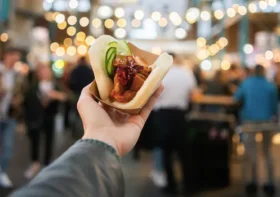UK names first food with protected status in post-Brexit scheme

In the wake of Brexit, the United Kingdom has embarked on a journey to redefine its agricultural landscape, emphasizing sustainability, quality, and tradition. As a significant step in this direction, the UK has announced its inaugural food product to receive protected status under its post-Brexit scheme. This designation not only celebrates the rich culinary heritage but also underscores the commitment to sustainable farming practices. In this article, we delve into the significance of this milestone and explore how it will drive sustainable agriculture in the UK.
The Dawn of a New Era: Protected Food Product
The UK’s decision to designate its first protected food product post-Brexit marks a pivotal moment in its agricultural policy. This coveted status, akin to the European Union’s Protected Geographical Indication (PGI) and Protected Designation of Origin (PDO), grants legal protection to traditional and regional foods. It safeguards their authenticity, preserves centuries-old practices, and fosters local economies.
The chosen food product, carefully selected based on its cultural significance and production methods, epitomizes the essence of British gastronomy. Whether it’s a historic cheese, a time-honored ale, or a cherished pastry, the protected status serves as a seal of approval, reassuring consumers of its origin and quality.
Promoting Sustainable Farming: A Multi-faceted Approach
At the heart of the UK’s post-Brexit agricultural strategy lies the promotion of sustainable farming practices. By conferring protected status upon a quintessentially British food product, the government aims to catalyze a holistic transformation within the agricultural sector. Let’s delve into the mechanisms through which this designation will promote sustainability:
Preservation of Biodiversity:
The traditional production methods associated with the protected food product often rely on locally sourced ingredients and traditional breeds. By safeguarding these time-honored practices, the UK fosters biodiversity conservation. Farmers, incentivized by the protected status, are more inclined to preserve native species and heirloom varieties, thereby enhancing ecosystem resilience.
Support for Small-Scale Producers:
Many of the UK’s cherished culinary delights are crafted by artisanal producers and family-run businesses. The protected status provides these small-scale farmers with a competitive edge in the market, shielding them from imitations and industrial-scale production. This support ensures the survival of traditional farming communities, preventing rural depopulation and preserving agricultural landscapes.
Reduction of Food Miles:
Embracing locally produced, protected foods reduces reliance on imports and minimizes carbon emissions associated with long-distance transportation. By prioritizing products with a smaller environmental footprint, consumers contribute to the fight against climate change. Moreover, shorter supply chains foster transparency and traceability, empowering consumers to make informed choices about their food consumption.
Promotion of Sustainable Land Management:
The production requirements stipulated for obtaining protected status often emphasize sustainable land management practices. From rotational grazing to agroforestry techniques, farmers are encouraged to adopt environmentally friendly approaches that enhance soil health and mitigate the negative impacts of agriculture on ecosystems. This convergence of tradition and innovation paves the way for regenerative farming models that prioritize long-term sustainability.
Cultural Heritage Conservation:
Beyond its economic and environmental implications, the designation of a protected food product celebrates cultural heritage and culinary diversity. It preserves ancestral knowledge passed down through generations, ensuring that future farmers continue to uphold traditions that define British identity. By fostering a deeper connection between consumers and their food heritage, the protected status instills a sense of pride and responsibility in preserving culinary legacies.
Looking Ahead: A Blueprint for Sustainable Agriculture
As the UK charts a new course in the post-Brexit era, the designation of its first protected food product serves as a blueprint for sustainable agriculture. By intertwining tradition with innovation, the UK is poised to redefine its agricultural narrative, placing sustainability at the forefront. However, realizing this vision requires collaboration across sectors, proactive policy interventions, and consumer engagement.
Governments must continue to incentivize sustainable farming practices through targeted support schemes and regulatory frameworks. Investment in research and development is crucial for equipping farmers with the knowledge and tools needed to navigate evolving environmental challenges. Likewise, educational initiatives aimed at raising awareness about the importance of sustainable food systems empower consumers to make ethically conscious choices.
In conclusion, the UK’s decision to bestow protected status upon its first food product in the post-Brexit era heralds a new chapter in the country’s agricultural legacy. By promoting sustainability, preserving cultural heritage, and supporting local economies, this designation embodies the essence of a forward-thinking agricultural policy. As the UK embraces a future rooted in tradition and innovation, the journey towards a more sustainable food system begins with a single bite.



Leave a Reply